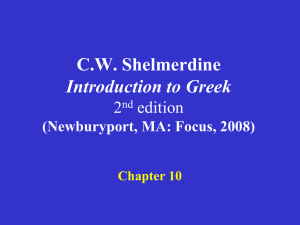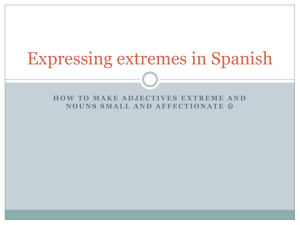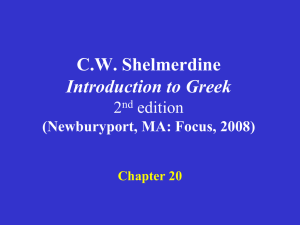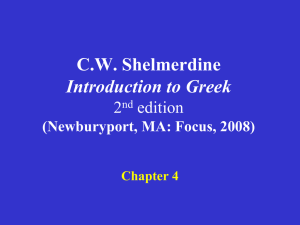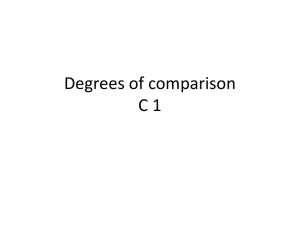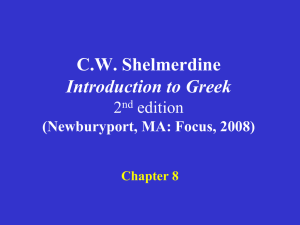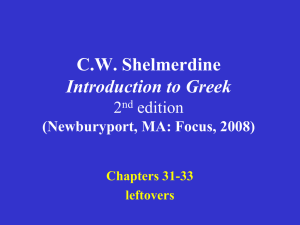Shelmerdine Chapter 16
advertisement
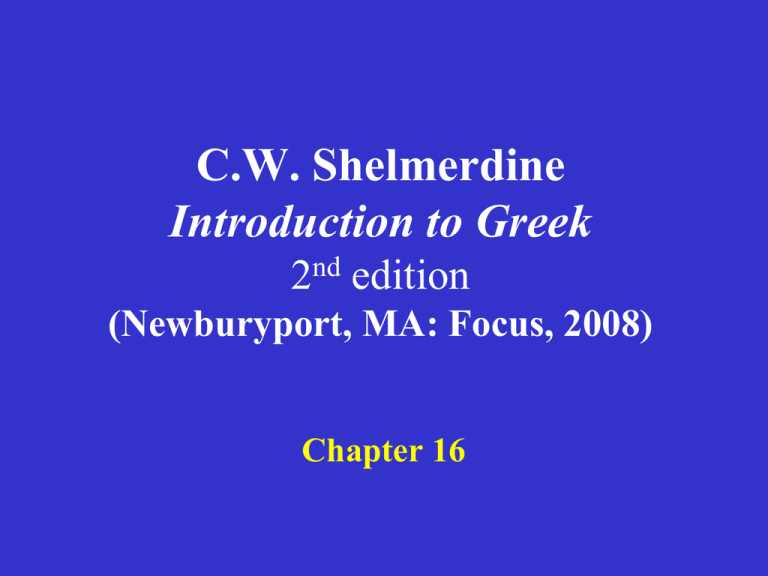
C.W. Shelmerdine Introduction to Greek 2nd edition (Newburyport, MA: Focus, 2008) Chapter 16 Shelmerdine Chapter 16 1. μέγας, πολύς and adjectives of the τάλας type 2. Regular comparison of adjectives 3. Comparison with ἤ and the genitive of comparison 4. Some uses of the genitive 5. Some uses of the dative Shelmerdine Chapter 16 1. μέγας, πολύς and adjectives of the τάλας type 2. Regular comparison of adjectives 3. Comparison with ἤ and the genitive of comparison 4. Some uses of the genitive 5. Some uses of the dative Shelmerdine Chapter 16 1. μέγας, πολύς and adjectives of the τάλας type • • • The textbook gives the forms of the combination 1st and 3rd declension adjective τάλας τάλαινα τάλαν “wretched.” Only two adjectives in Greek follow this pattern, this one and μέλας μέλαινα μέλαν “black.” Neither of these are in your Core Vocabulary, so you are not responsible for this pattern. Shelmerdine Chapter 16 1. μέγας, πολύς and adjectives of the τάλας type • Two common adjectives have normal 1st and 2nd declension endings except for the masc/neut nom/acc/voc forms. – – μέγας μεγάλη μέγα “big” πολύς πολλή πολύ “much, many” Shelmerdine Chapter 16 1. μέγας, πολύς and adjectives of the τάλας type Thus the masculine forms of the adjective μέγας μεγάλη μέγα “big” singular μέγας μεγάλου μεγάλῳ μέγαν μεγάλε plural μεγάλοι μεγάλων μεγάλοις μεγάλους Voc. = nom. Shelmerdine Chapter 16 1. μέγας, πολύς and adjectives of the τάλας type The feminine forms of the adjective μέγας μεγάλη μέγα “big” are completely regular. singular μεγάλη μεγάλης μεγάλῃ μεγάλην Voc. = nom. plural μεγάλαι μεγάλων μεγάλαις μεγάλας Voc. = nom. Shelmerdine Chapter 16 1. μέγας, πολύς and adjectives of the τάλας type Thus the neuter forms of the adjective μέγας μεγάλη μέγα “big” singular μέγα μεγάλου μεγάλῳ Acc. = nom. Voc. = nom. plural μεγάλα μεγάλων μεγάλοις Acc. = nom. Voc. = nom. Shelmerdine Chapter 16 1. μέγας, πολύς and adjectives of the τάλας type • Two common adjectives have normal 1st and 2nd declension endings except for the masc/neut nom/acc/voc forms. – – μέγας μεγάλη μέγα “big” πολύς πολλή πολύ “much, many” Shelmerdine Chapter 16 1. μέγας, πολύς and adjectives of the τάλας type Thus the masculine forms of the adjective πολύς πολλή πολύ “much, many” singular πολύς πολλοῦ πολλῷ πολύν πολύς plural πολλοί πολλῶν πολλοῖς πολλούς Voc. = nom. Shelmerdine Chapter 16 1. μέγας, πολύς and adjectives of the τάλας type The feminine forms of the adjective πολύς πολλή πολύ “much, many” are completely regular. singular πολλή πολλῆς πολλῇ πολλήν Voc. = nom. plural πολλαί πολλῶν πολλαῖς πολλάς Voc. = nom. Shelmerdine Chapter 16 3. μέγας, πολύς and adjectives of the τάλας type Thus the neuter forms of the adjective πολύς πολλή πολύ “much, many” singular πολύ πολλοῦ πολλῷ Acc. = nom. Voc. = nom. plural πολλά πολλῶν πολλοῖς Acc. = nom. Voc. = nom. Shelmerdine Chapter 16 1. μέγας, πολύς and adjectives of the τάλας type 2. Regular comparison of adjectives 3. Comparison with ἤ and the genitive of comparison 4. Some uses of the genitive 5. Some uses of the dative Shelmerdine Chapter 16 2. Regular comparison of adjectives • • Recall the rules and forms for adjectives from Chapter 7. Like the definite article, adjectives always agree with nouns in gender, number, and case. Shelmerdine Chapter 16 2. Regular comparison of adjectives • Adjectives use the same endings as nouns of the 1st and 2nd declension, differentiated by gender: – – – When modifying a masculine noun, the adjective uses 2nd declension masculine endings (like λόγος) When modifying a feminine noun, the adjective uses 1st declension endings (like τιμή) When modifying a neuter noun, the adjective uses 2nd declension neuter endings (like ζυγόν) Shelmerdine Chapter 16 2. Regular comparison of adjectives • When modifying a masculine noun, the adjective uses 2nd declension masculine endings (like λόγος). Hence σοφός -ή -όν “wise” singular σοφός σοφοῦ σοφῷ σοφόν σοφέ plural σοφοί σοφῶν σοφοῖς σοφούς Voc. = nom. Shelmerdine Chapter 16 2. Regular comparison of adjectives • When modifying a feminine noun, the adjective uses 1st declension endings (like τιμή). Hence σοφός -ή -όν “wise” singular Nom. σοφή Gen. σοφῆς Dat. σοφῇ Acc. σοφήν Voc. = Nom. plural Nom. σοφαί Gen. σοφῶν Dat. σοφαῖς Acc. σοφάς Voc. = Nom. Shelmerdine Chapter 16 2. Regular comparison of adjectives • But, as with first declension nouns, if the stem of the adjective ends in ε, ι, or ρ, then a long α replaces the η in the singular (like χώρα). Hence φίλιος -α -ον “friendly,” when it modifies a feminine singular noun: singular Nom. φιλία Gen. φιλίας Dat. φιλίᾳ Acc. φιλίαν Voc. = Nom. Shelmerdine Chapter 16 2. Regular comparison of adjectives • When modifying a neuter noun, the adjective uses 2nd declension neuter endings (like ζυγόν). Hence σοφός -ή -όν “wise” singular σοφόν σοφοῦ σοφῷ Acc. = nom. Voc. = nom. plural σοφά σοφῶν σοφοῖς Acc. = nom. Voc. = nom. Shelmerdine Chapter 16 2. Regular comparison of adjectives • In a vocabulary, glossary, lexicon, or dictionary, a Greek adjective is listed by its (1) masculine nominative singular (2) feminine nominative singular ending (3) neuter nominative singular ending – σοφός -ή -όν “wise” – φίλιος -α -ον “friendly” Shelmerdine Chapter 16 parse/parsing • MASCULINE, FEMININE, or NEUTER • SINGULAR or PLURAL • NOMINATIVE, GENITIVE, DATIVE, ACCUSATIVE, or VOCATIVE Shelmerdine Chapter 16 2. Regular comparison of adjectives • “Comparison” of adjectives refers to forming the different degrees of adjectives – Positive degree is the regular form of the adjective • σοφός -ή -όν “wise” Shelmerdine Chapter 16 2. Regular comparison of adjectives • “Comparison” of adjectives refers to forming the different degrees of adjectives – Comparative degree means the adjective has more of its quality than someone or something else • σοφώτερος -α -ον “wiser” Shelmerdine Chapter 16 2. Regular comparison of adjectives • “Comparison” of adjectives refers to forming the different degrees of adjectives – Superlative degree means the adjective has the most of its quality • σοφώτατος -η -ον “wisest” Shelmerdine Chapter 16 2. Regular comparison of adjectives • • An ο or ω appears between the stem of the adjective and the τερ/τατ marker of change in degree. Generally speaking, the length of this vowel is opposite that of the preceding vowel. • μωρότερος -α -ον σοφώτερος -α -ον long short • short long Since the comparative marker -τερ- ends in ρ, the feminine singular regularly will use α in place of η (like φίλιος -α -ον). Shelmerdine Chapter 16 2. Regular comparison of adjectives • As in English, some adjectives form their comparatives and superlatives differently. Chapter 23 will focus on these irregular comparisons. • ἀγαθός -ή -όν “good” • ἀμείνων -ον “better” • ἄριστος -η -ον “best” Shelmerdine Chapter 16 1. μέγας, πολύς and adjectives of the τάλας type 2. Regular comparison of adjectives 3. Comparison with ἤ and the genitive of comparison 4. Some uses of the genitive 5. Some uses of the dative Shelmerdine Chapter 16 3. The use of ἤ and the genitive of comparison • When an adjective appears in the comparative degree, Greek uses the word ἤ to mean “than,” comparing two nouns in the same case. αἱ κάμηλοι δεινότεροι ἦσαν τοῖς στρατιώταις ἢ οἱ ναῦται. • – • The camels were more terrible to the soldiers than the sailors (were). αἱ κάμηλοι δεινότεροι ἦσαν τοῖς στρατιώταις ἢ τοῖς ναύταις. – The camels were more terrible to the soldiers than to the sailors. Shelmerdine Chapter 16 3. The use of ἤ and the genitive of comparison • When an adjective appears in the comparative degree, Greek uses the word ἤ to mean “than,” comparing two nouns in the same case. ἡ τοῦ ποιητοῦ γυνὴ σοφωτέρα ἐστὶν ἢ ἡ τοῦ δούλου. • – • The poet’s wife is wiser than the slave’s (wife). ἡ τοῦ ποιητοῦ γυνὴ σοφωτέρα ἐστὶν ἢ ὁ δοῦλος. – The poet’s wife is wiser than the slave. Shelmerdine Chapter 16 η! What’s that? Pay close attention to the accent and breathing of ἤ, so you do not confuse it with other words of totally different meaning. • ἤ or ἢ (smooth breathing, acute or grave accent) – – • “than” with a comparative “or” otherwise ἡ (rough breathing, no accent) – • “the” fem. nom. sg. of definite article ἥ or ἣ (rough breathing, acute or grave accent) – • “who, which” fem. nom. sg. of relative pronoun ἦ (smooth breathing, circumflex accent) – • “I was” 1st sg. imperfect indicative active of εἰμί “be” ᾗ (rough breathing, circumflex accent, iota subscript) – “to whom, to which, where” fem. dat. sg. of relative pronoun Shelmerdine Chapter 16 3. The use of ἤ and the genitive of comparison • When an adjective appears in the comparative degree, to say “x is more something than y,” y can appear in the genitive case, without the word ἤ. This use of the genitive is called the “genitive of comparison.” • – ὁ Σωκράτης σοφώτερος ἦν τῶν ἄλλων. • Socrates was wiser than the others. Shelmerdine Chapter 16 1. μέγας, πολύς and adjectives of the τάλας type 2. Regular comparison of adjectives 3. Comparison with ἤ and the genitive of comparison 4. Some uses of the genitive 5. Some uses of the dative Shelmerdine Chapter 15 4. Some uses of the genitive • The partitive genitive means the genitive literally refers to the whole or a group from which a part is designated and usually translates smoothly to “of” in English: – οἱ σοφώτατοι τῶν ἀνδρῶν • – the wisest of the men πολὺ τοῦ ἄστεως • – much of the town ἐκάστη τῶν νεῶν • each of the ships Shelmerdine Chapter 16 4. Some uses of the genitive • The partitive genitive means the genitive literally refers to the whole or a group from which a part is designated and usually translates smoothly to “of” in English: • ὁ Σωκράτης ἦν σοφώτατος τῶν τότε. – • Socrates was the wisest of the people of that time. ὁ Σωκράτης σοφώτατος ἦν τῶν Ἀθηναίων. – Socrates was the wisest of the Athenians. Shelmerdine Chapter 16 4. Some uses of the genitive • In both Greek and English, the subject-verb-object combination can be conveyed entirely with nouns. Just as English uses “of” in this construction, Greek uses the Genitive case: οἱ στράτηγοι θύουσι τοὺς βοῦς. • – • The generals (subject) sacrifice (verb) the oxen (object). ἀγγέλομεν τῶν στρατήγων τὴν θύσιαν. – • We announce the generals’ (subjective genitive) sacrifice (noun). ἀγγέλομεν τὴν θύσιαν τῶν βοῶν. – We announce the sacrifice (noun) of the oxen (objective genitive). Shelmerdine Chapter 16 1. μέγας, πολύς and adjectives of the τάλας type 2. Regular comparison of adjectives 3. Comparison with ἤ and the genitive of comparison 4. Some uses of the genitive 5. Some uses of the dative Shelmerdine Chapter 16 5. Some uses of the dative • Recall that the means or instrument for accomplishing something regularly goes in the dative case: ὁ κριτὴς ἔλεξε μεγάλῃ φωνῇ. • – • The judge spoke with a loud voice. ἔφυγον μακρᾷ ὁδῷ. – They fled using a long road. Shelmerdine Chapter 16 5. Some uses of the dative • When the means is an abstract noun, this usage seems more adverbial and is traditionally called the dative of manner: ὁ κριτὴς ἔλεξε πολλῇ σοφίᾳ. • – • The judge spoke with much wisdom. ἔφυγον φόβῳ. – They fled in fear. Shelmerdine Chapter 16 5. Some uses of the dative • Another extension of the dative of means or instrument occurs with comparatives, the degree of difference: • ὁ Σωκράτης πολλῷ σοφώτερος ἦν τῶν ἄλλων. – • Socrates was much wiser than the others (by means of much). ὀλίγαις ἡμέραις ἡ ὁδὸς αὐτῶν ἦν μακροτέρα. – Their journey was a few days longer (longer by a few days). Shelmerdine Chapter 16 5. Some uses of the dative • Recall that the dative is generally used for a secondary (indirect) object. The dative of (dis)advantage indicates that this secondary object receives benefit or harm: ἔγραψε νόμους τοῖς πολίταις. • – • He wrote laws for the citizens. οἱ χειμῶνες κίνδυνός εἰσι τοῖς ναύταις. – Storms are a danger for sailors. Greece Egypt Shelmerdine Chapter 16 τοῖς δὲ Αἰγυπτίοις οἱ πολλοὶ κώνωπες ἄλγος εἰσίν. οἳ μὲν οὖν τὰς κώμας ἄνω τῶν λιμνῶν ἔχουσιν ἀναβαίνουσιν εἰς πύργους ὑψηλοὺς καὶ ἐκεῖ καθεύδουσιν· οἱ γὰρ κώνωπες διὰ τοὺς ἀνέμους οὐχ οἷοί τ' εἰσὶν ἀναβαίνειν· Shelmerdine Chapter 16 τοῖς δὲ Αἰγυπτίοις οἱ πολλοὶ κώνωπες ἄλγος εἰσίν. οἳ μὲν οὖν τὰς κώμας ἄνω τῶν λιμνῶν ἔχουσιν ἀναβαίνουσιν εἰς πύργους ὑψηλοὺς καὶ ἐκεῖ καθεύδουσιν· οἱ γὰρ κώνωπες διὰ τοὺς ἀνέμους οὐχ οἷοί τ' εἰσὶν ἀναβαίνειν· Shelmerdine Chapter 16 τοῖς δὲ Αἰγυπτίοις οἱ πολλοὶ κώνωπες ἄλγος εἰσίν. οἳ μὲν οὖν τὰς κώμας ἄνω τῶν λιμνῶν ἔχουσιν ἀναβαίνουσιν εἰς πύργους ὑψηλοὺς καὶ ἐκεῖ καθεύδουσιν· οἱ γὰρ κώνωπες διὰ τοὺς ἀνέμους οὐχ οἷοί τ' εἰσὶν ἀναβαίνειν· Shelmerdine Chapter 16 οἱ δὲ περὶ τὰς λίμνας Αἰγύπτιοι ἀντὶ τῶν πύργων τὰ σώματα ὧδε φυλάττουσιν· ἕκαστος ἀνὴρ αὐτῶν ἀμφίβληστρον ἔχει, ᾧ τῆς μὲν ἡμέρας ἰχθῦς θηρεύει, τῆς δὲ νυκτὸς περὶ κοίτην βάλλει τὸ ἀμφίβληστρον καὶ ὑπ' αὐτῷ καθεῦδει. εἰ γὰρ μόνον ἐν ἱματίῳ καθεύδει, οἱ κώνωπες δι' αὐτοῦ δάκνουσιν, διὰ δὲ τοῦ ἀμφιβλήστρου οὔ. Shelmerdine Chapter 16 οἱ δὲ περὶ τὰς λίμνας Αἰγύπτιοι ἀντὶ τῶν πύργων τὰ σώματα ὧδε φυλάττουσιν· ἕκαστος ἀνὴρ αὐτῶν ἀμφίβληστρον ἔχει, ᾧ τῆς μὲν ἡμέρας ἰχθῦς θηρεύει, τῆς δὲ νυκτὸς περὶ κοίτην βάλλει τὸ ἀμφίβληστρον καὶ ὑπ' αὐτῷ καθεῦδει. εἰ γὰρ μόνον ἐν ἱματίῳ καθεύδει, οἱ κώνωπες δι' αὐτοῦ δάκνουσιν, διὰ δὲ τοῦ ἀμφιβλήστρου οὔ. Shelmerdine Chapter 16 οἱ δὲ περὶ τὰς λίμνας Αἰγύπτιοι ἀντὶ τῶν πύργων τὰ σώματα ὧδε φυλάττουσιν· ἕκαστος ἀνὴρ αὐτῶν ἀμφίβληστρον ἔχει, ᾧ τῆς μὲν ἡμέρας ἰχθῦς θηρεύει, τῆς δὲ νυκτὸς περὶ κοίτην βάλλει τὸ ἀμφίβληστρον καὶ ὑπ' αὐτῷ καθεῦδει. εἰ γὰρ μόνον ἐν ἱματίῳ καθεύδει, οἱ κώνωπες δι' αὐτοῦ δάκνουσιν, διὰ δὲ τοῦ ἀμφιβλήστρου οὔ. Shelmerdine Chapter 16 12. εἰ δὲ Χριστὸς κηρύσσεται ὅτι ἐκ νεκρῶν ἐγήγερται, πῶς λέγουσιν ἐν ὑμῖν τινες ὅτι ἀνάστασις νεκρῶν οὐκ ἔστιν; ἀνάστασις –εως ἡ resurrection ἐγείρω, ἐγερῶ, ἤγειρα, --, ἐγήργημαι, ἠγέρθην raise, resurrect ἐγήγερται “has been raised” κηρύσσω proclaim, preach νεκρός –ά –όν dead ὅτι that, because πῶς how τινες (nom. pl.) some ὑμῖν (dat. pl.) y'all Shelmerdine Chapter 16 12. εἰ δὲ Χριστὸς κηρύσσεται ὅτι ἐκ νεκρῶν ἐγήγερται, πῶς λέγουσιν ἐν ὑμῖν τινες ὅτι ἀνάστασις νεκρῶν οὐκ ἔστιν; ἀνάστασις –εως ἡ "resurrection" ἐγείρω, ἐγερῶ, ἤγειρα, --, ἐγήργημαι, ἠγέρθην raise, resurrect ἐγήγερται “has been raised” κηρύσσω proclaim, preach νεκρός –ά –όν dead ὅτι that, because πῶς how τινες (nom. pl.) some ὑμῖν (dat. pl.) y'all Shelmerdine Chapter 16 13. εἰ δὲ ἀνάστασις νεκρῶν οὐκ ἔστιν, οὐδὲ Χριστὸς ἐγήγερται· 14. εἰ δὲ Χριστὸς οὐκ ἐγήγερται, κενὸν ἄρα [καὶ] τὸ κήρυγμα ἡμῶν, κενὴ καὶ ἡ πίστις ὑμῶν, 15. εὑρισκόμεθα δὲ καὶ ψευδομάρτυρες τοῦ θεοῦ, ὅτι ἐμαρτυρήσαμεν κατὰ τοῦ θεοῦ ὅτι ἤγειρεν τὸν Χριστόν, ὃν οὐκ ἤγειρεν εἴπερ ἄρα νεκροὶ οὐκ ἐγείρονται. κήρυγμα –ατος τό message ἀνάστασις –εως ἡ resurrection μαρτυρέω testify ἄρα = οὖν νεκρός –ά –όν dead ἐγείρω, ἐγερῶ, ἤγειρα, --, ἐγήργημαι, ὅτι that, because ἠγέρθην raise, resurrect πίστις –εως ἡ faith ἐγήγερται “has been raised“ ὑμῶν (gen. pl.) ὑμῖν (dat. pl.) y'all ἡμῶν (gen. pl.) "of us" ψευδόμαρτυς -υρος ὁ false witness κενός -ή -όν empty Shelmerdine Chapter 16 16. εἰ γὰρ νεκροὶ οὐκ ἐγείρονται, οὐδὲ Χριστὸς ἐγήγερται· 17. εἰ δὲ Χριστὸς οὐκ ἐγήγερται, ματαία ἡ πίστις ὑμῶν, ἔτι ἐστὲ ἐν ταῖς ἁμαρτίαις ὑμῶν. 18. ἄρα καὶ οἱ κοιμηθέντες ἐν Χριστῷ ἀπώλοντο. ἁμαρτία –ας ἡ sin ἀπώλοντο (3rd pl aor.) "died" ἄρα = οὖν ἐγείρω, ἐγερῶ, ἤγειρα, --, ἐγήργημαι, ἠγέρθην raise, resurrect ἐγήγερται “has been raised“ κοιμηθέντες (aor.) "those who have fallen asleep" μάταιος –α –ον worthless νεκρός –ά –όν dead πίστις –εως ἡ faith ὑμῶν (gen. pl.) “of y'all" Shelmerdine Chapter 16 19. εἰ ἐν τῇ ζωῇ ταύτῃ ἐν Χριστῷ ἠλπικότες ἐσμὲν μόνον, ἐλεεινότεροι πάντων ἀνθρώπων ἐσμέν. 20. νυνὶ δὲ Χριστὸς ἐγήγερται ἐκ νεκρῶν, ἀπαρχὴ τῶν κεκοιμημένων. ἀπαρχή -ῆς ἡ first-offering ἐγείρω, ἐγερῶ, ἤγειρα, --, ἐγήργημαι, ἠγέρθην raise, resurrect ἐγήγερται “has been raised“ ἐλεεινός –ή -όν pitiful ζωή -ῆς ἡ life ἠλπικότες (nom. pl.) "[those] who had hope" κεκοιμημένων (perf.) "those who have fallen asleep" μόνον "only" νεκρός –ά –όν dead νυνὶ now πάντων (gen. pl.) all ταύτῃ (fem. dat. sg.) this Shelmerdine Chapter 16 21. ἐπειδὴ γὰρ δι᾽ ἀνθρώπου θάνατος, καὶ δι᾽ ἀνθρώπου ἀνάστασις νεκρῶν· 22. ὥσπερ γὰρ ἐν τῷ Ἀδὰμ πάντες ἀποθνῄσκουσιν, οὕτως καὶ ἐν τῷ Χριστῷ πάντες ζῳοποιηθήσονται. (Πρὸς Κορινθίους α´ 15.12-22) νεκρός –ά –όν "dead“ ἀνάστασις –εως ἡ "resurrection" οὕτως "this way" ἐγείρω, ἐγερῶ, ἤγειρα, --, ἐγήργημαι, ἠγέρθην πάντες (nom. pl.) "all" "raise, resurrect" ὥσπερ "just as" ἐγήγερται “has been raised“ ἐπειδὴ "since" ζῳοποιέω, -ποιήσω, -εποίησα, -πεποίηκα, -πεποίημαι, -εποιήθην "make alive"

